





ENVIRONMENTAL, SOCIAL AND GOVERNANCE CREATING RESILIENCE









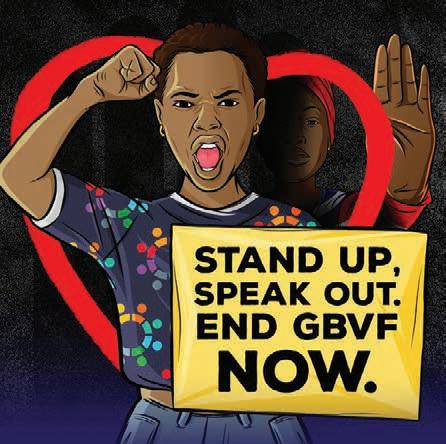

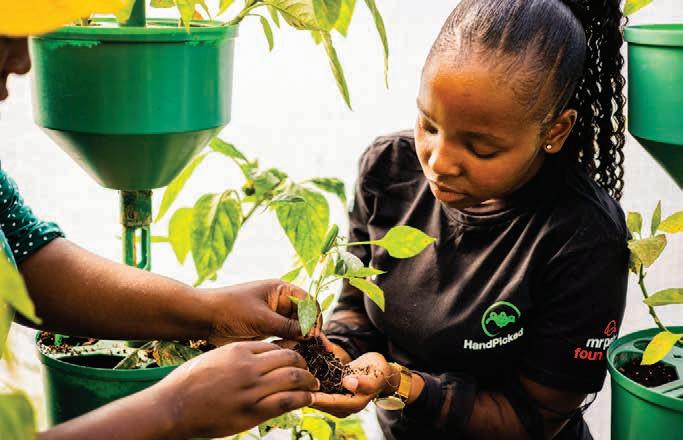







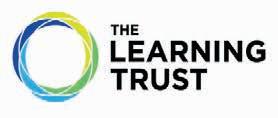
















The current political scenario in our country, unprecedented and historic as it is, offers all of us an opportunity to re ect on how we do things.
This Government of National Unity is different from the one led by Nelson Mandela in 1994. Mandela’s party, the African National Congress, had an overwhelming majority and invited others to rule with them. President Cyril Ramaphosa’s ANC lost its majority in the May elections and was forced to look at alternative ways of governing. But every challenge presents an opportunity.
In his Opening of Parliament Address on 18 July 2024, Mandela Day, President Cyril Ramaphosa said: “We are reminded on this day that we have a responsibility to each other; and that our wellbeing and our happiness cannot be separated from those of our fellow woman and man.
“The Government of National Unity has resolved to dedicate the next ve years to actions that will advance three strategic priorities. Firstly, to drive inclusive growth and job creation. Secondly, to reduce poverty and tackle the high cost of living. Thirdly, to build a capable, ethical and developmental state.”
Corporates have an opportunity to re ect on how aligned their social impact plans are with the plans of government and whether they are helping to alleviate the major challenges in our society. This will ensure that their spend has the best possible return on investment from a social impact point of view.
In this publication, we look at what some corporates are doing in key areas such as education, health and job creation. We hope you enjoy the read.
Ryland Fisher Editor
Three decades after the rst democratic elections it’s hard to understand how any citizen of our country goes to bed hungry, homeless and struggles to eke out a meagre living or access a quality education.
Phinah Kodisang, CEO of the Soul City Institute of Social Justice, one of the leading organisations driving social, political and empowerment for women in South Africa, speaks out on why empowering women matters.
10 TECHNOLOGY
We unpack how technology is driving social impact, transformation and much-needed job creation across various sectors.
13 HEALTH
Despite the helping hands of a few, access to basic healthcare in rural areas remains a worrying challenge in South Africa, we nd out what communities are doing to resolve the issues.

Even though ESG principles can potentially improve the lives of communities by making them more resilient, initiatives focused on the wellbeing and growth of each individual is as important to uplift and build resilient communities.
A look at how social investment initiatives can contribute to the economic empowerment, education and social development of the youth.
We shine a spotlight on educational programmes and initiatives aimed at closing the gap in access to quality education in underserved communities.
How Sappi is uplifting communities by educating and supporting small growers to enter the forestry sector.
PUBLISHED BY
Picasso Headline, A proud division of Arena Holdings (Pty) Ltd, Hill on Empire, 16 Empire Road (cnr Hillside Road), Parktown, Johannesburg, 2193 PO Box 12500, Mill Street, Cape Town, 8010 www.businessmediamags.co.za
EDITORIAL
Editor: Ryland Fisher
Content Manager: Raina Julies, rainaj@picasso.co.za
Contributors: Trevor Crighton, Mwangi Githahu, Nadia Lubowski, Vukani Magubane, Busani Moyo, Sandile Nkosi, Thando Pato, Octavius Phukubye
Copy Editor: Brenda Bryden
Content Co-ordinator: Natasha Maneveldt
Online Editor: Stacey Visser vissers@businessmediamags.co.za
DESIGN
Head of Design: Jayne Macé-Ferguson
Senior Designer: Mfundo Archie Ndzo
Cover Images: Supplied, Courtesy Early Learning Resources Unit, image courtesy of The Learning Trust, Mickywiswedel/Istock.com
SALES
Project Manager: Tarin-Lee Watts wattst@picasso.co.za +27 87 379 7119 | +27 79 504 7729
PRODUCTION
Production Editor: Shamiela Brenner
Advertising Co-ordinator: Johan Labuschagne
Subscriptions and Distribution: Fatima Dramat fatimad@picasso.co.za
Printer: CTP Printers, Cape Town
MANAGEMENT
Management Accountant: Deidre Musha
Business Manager: Lodewyk van der Walt
General Manager, Magazines: Jocelyne Bayer
COPYRIGHT: Picasso Headline. No portion of this magazine may be reproduced in any form without written consent of the publisher. The publisher is not responsible for unsolicited material. SOCIAL IMPACT is published by Picasso Headline. The opinions expressed are not necessarily those of Picasso Headline. All advertisements/ advertorials have been paid for and therefore do not carry any endorsement by the publisher.

In today’s rapidly evolving digital landscape, technology holds immense potential to address some of Africa’s most pressing challenges, writes STEPHEN CHEGE, chief regulatory and external affairs officer at Vodacom Group
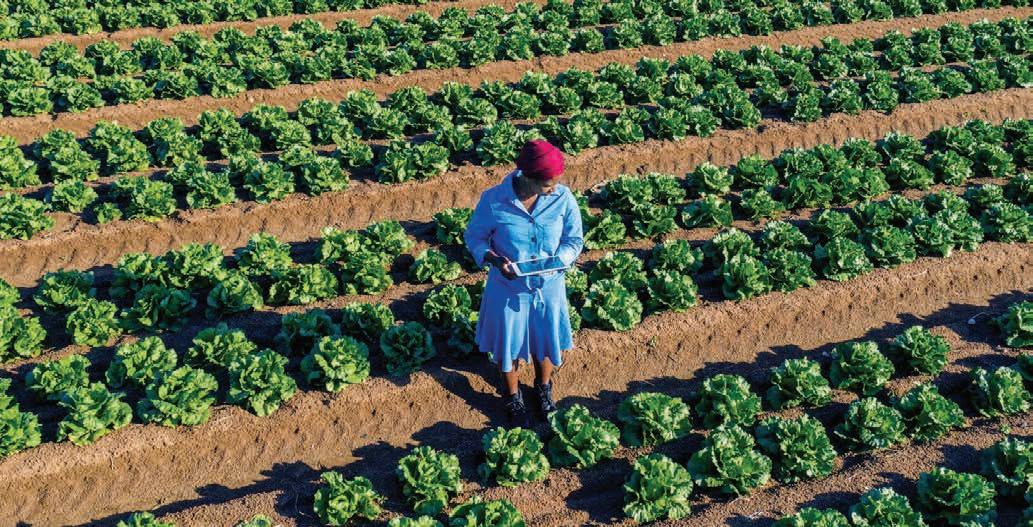
E-LEARNING AND DIGITAL CLASSROOMS HAVE MADE IT POSSIBLE FOR STUDENTS IN REMOTE OR UNDERSERVED AREAS TO ACCESS QUALITY EDUCATION.
The concept of “Tech for Good” emphasises using technology to create positive social change, including leveraging technology to mitigate negative environmental impacts. These digital solutions are helping promote inclusion, bridge disparities and transform critical sectors to build an equitable and sustainable future.
Looking speci cally at the impact of mobile connectivity, the GSMA’s Mobile Economy 2024 report notes how the impact of mobile connectivity is evidenced by its contribution to the economy. For instance, in 2023, mobile technologies and services generated 5.4 per cent of global gross domestic product, a contribution that amounted to $5.7-trillion of added economic value and supported around 35 million jobs.
Access to quality education is a fundamental human right. Yet, a progress report by the African Futures and Innovation programme
at the Institute for Security Studies on implementing the African Union’s Agenda 2063 shows that the continent is failing to meet education targets, putting sustainable development at risk. Tech for Good solutions can help to overcome this challenge, democratising access to learning opportunities.
E-learning and digital classrooms have made it possible for students in remote or underserved areas to access quality education. Platforms, such as Ta3limy in Egypt, e-Fahamu in Tanzania, VodaEduc in the Democratic Republic of Congo (DRC), Faz Crescer in Mozambique and e-learning in South Africa, provide a wealth of online resources catering to different learning needs. Digital literacy can help develop skills in science, technology, engineering and mathematics (STEM), which are critical to jobs in the future. We aim to help break down gender stereotypes in STEM education, as seen in our Code Like a Girl programme, and are now aiming to empower one million young people with digital skills training on the continent.

Additionally, technological innovations improve ef ciencies and productivity for healthcare service providers and promote access to quality facilities. Notable initiatives include our stock visibility services in South Africa, m-mama for maternal and neonatal emergencies in Tanzania and Lesotho as well as digitalising Universal Health Insurance in Egypt. We are working with the Vodafone Foundation, the United States Agency for International Development and local governments to expand m-mama, a technology-based emergency transport system, to more African countries.

WE PROACTIVELY COLLABORATE WITH STRATEGIC PARTNERS AND GOVERNMENTS TO PROMOTE ACCESS TO INCLUSIVE QUALITY HEALTHCARE THROUGH OUR VARIOUS TECH FOR GOOD SOLUTIONS.

Despite advancements in medical science, access to quality healthcare remains a challenge in Africa, particularly in remote areas. This is why we proactively collaborate with strategic partners and governments to promote access to inclusive quality healthcare through our various Tech for Good solutions. In Egypt, for example, we have partnered with the Ministry of Health to enhance healthcare delivery through digitalisation. By the end of March 2024, we had reached 309 hospitals and served 6.3 million people through this partnership.
Beyond critical industries, Tech for Good solutions are also driving socioeconomic empowerment in underserved communities. We have seen the impact of mobile money platforms, such as M-Pesa, accelerating nancial inclusion on the continent. This includes providing access to payments, loans and savings to those traditionally excluded from nancial services while also enabling small business growth through merchant solutions. Vodacom also supports gender empowerment through digital technologies, such as the Bright Sky app in South Africa and the Nokaneng app in Lesotho, which assist those experiencing gender-based violence to access help.
As technology continues to evolve, it offers unprecedented opportunities to bridge inequalities and create inclusive societies. The private sector, governments and civil society must work together to create an enabling environment for this to happen, from investing in digital infrastructure to fostering policies that support innovation and inclusion. Only through such collaborative efforts can we harness the full potential of technology to drive change for good.
Smallholder farmers, who constitute most of the agricultural workforce in Africa, often face challenges such as low productivity, limited access to markets and vulnerability to climate change. Technology can provide tools to improve their outputs and their livelihoods. We work with local partners to expand our agricultural digitalisation initiatives, which already include e-Vuna, e-vouchering and M-Kulima. In the DRC, we are piloting the Moloni agritech platform, developed by a start-up identi ed from our Kadea digital skills programme, which provides farmers with weather reports, sustainable farming
advice and a digital marketplace connecting agricultural value chain players. These solutions can not only boost agricultural productivity, but also contribute to broader United Nations’ Sustainable Development Goals that speak to food security and poverty reduction. Agricultural productivity is vital for Africa’s economic future, and enhancing productivity and competitiveness is key to unlocking this potential. Through our subsidiaries, Mezzanine, M-Pesa and IoT.nxt, we provide various agriculture digitalisation tools and platforms that enable the ef cient distribution and use of inputs, provide access to insurance and funding, unlock markets and facilitate payments and subsidies. Mezzanine’s eVuna and e-Vouchering solutions reach 6.4 million bene ciaries. In Tanzania, the M-Kulima agricultural platform, integrated with M-Pesa, has 3.2 million registered farmers. There is no doubt that mobile connectivity and leveraging new technology not only drives digital innovation on the continent, but also empowers individuals and enterprises with a wide variety of transformative solutions while also aiding governments in delivering positive societal impacts.







Three decades after the first democratic elections it’s hard to understand how any citizen of our country goes to bed hungry, homeless and struggles to eke out a meagre living or access a quality education, writes NADIA LUBOWSKI, director of the Anton Lubowski Educational Trust
It’s been 30 years since the dawn of democracy in South Africa and so much of the hope and idealism that characterised those pivotal elections has been snuffed out in the intervening years. Instead, there’s an air of despondency in South Africa amid a sense that so much is broken. Rising poverty levels, municipal service delivery failures, high levels of corruption, crime and violence, growing levels of hunger and worsening educational outcomes make it hard to remain optimistic. How did we go from a thriving economy after 1994 to one struggling to achieve even one per cent gross domestic product growth? How have we allowed our educational standards to drop so much that most Grade 4s can’t read for meaning? Why have we failed to tackle racism and misogyny adequately?
I don’t doubt that the current state of our country and our failure to live up to the promise and potential touted in 1994 would cause immense distress to all those who fought so hard to make a positive difference in South Africa – people such as Chris Hani and my father, Anton Lubowski, both of whom paid the ultimate price for their convictions with their lives.
The national elections in May this year saw politicians across the political spectrum pointing out the gross inequality in this country but other than positing vague and opaque solutions, provided little tangible evidence of concrete solutions.
The World Bank calls South Africa one of the most unequal countries in the world and says inequality has increased since 1994. Poverty has remained consistently higher among black South Africans, typically the less educated, unemployed, female-headed households, large families and children.
South Africa’s inequality is not only demonstrated in its income distribution, which, according to the International Monetary Fund, sees the top 20 per cent of the population holding more than 65 per cent of income, but is also manifested in unequal access to opportunities including education, healthcare and jobs. A low-growth economy and persistently high rates of unemployment are perpetuating this inequality.
I am starting to believe that the world we live in is the inevitable outcome of the way we have decided to structure our governments, our economies and our communities. I’ve been asking myself big questions during the recent election period; questions such as what does equality really mean, how can we become a more uni ed country, how can we collaborate better with each other, and what is true freedom? Ironically, these are very similar to the questions my father asked himself as he fought to bring an end to apartheid.
The million-dollar question is whether South Africa has the capacity to ever achieve true equality, tolerance and genuine respect for others and provide every citizen with the nancial freedom required to live life on their terms.
We all have the right to dignity and the material things required to live a digni ed life. However, many people continue to live without access to clean water, adequate food, safety and shelter. Addressing this requires that we grow our economy so that every able citizen can access some type of employment to improve the standard and quality of their lives.
A growing and ourishing economy needs labour and must be able to invest in skills

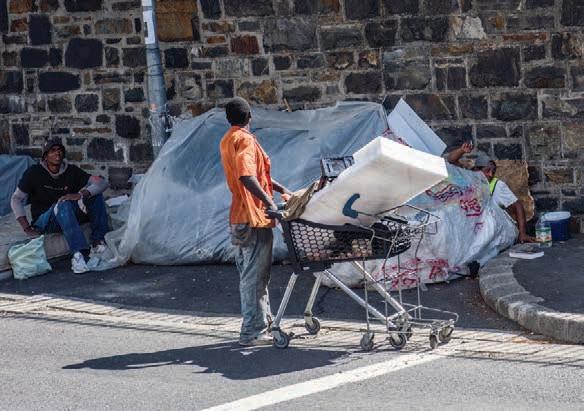
WE SHOULD ALL BECOME PART OF A SOCIAL MOVEMENT OR NONGOVERNMENTAL ORGANISATION AND WORK TO MAKE THE CHANGES OUR COUNTRY DESPERATELY NEEDS TO ENSURE A MORE EQUITABLE FUTURE FOR ALL ITS CITIZENS.
development and pay decent wages. It’s about making the pie bigger to bene t more people rather than trying to redistribute an ever-diminishing pie.
At the same time, we need to learn to acknowledge and celebrate our differences and cohabit peacefully and respectfully with our fellow citizens. We must become more tolerant and listen more carefully, particularly to those who hold views unaligned with our own. We need to learn to disagree respectfully and without hate or judgement.
We also need to become better at collaborating. Together we can accomplish so much more than we will ever be able to on our own. We must work with our local community leaders – in churches, schools and NGOs,
among others – to collectively address our most pressing challenges. As individuals, we need to consider our own subconscious biases and consciously focus on becoming better at collaborating, listening and understanding the perspectives of others.
We should all become part of a social movement or nongovernmental organisation and work to make the changes our country desperately needs to ensure a more equitable future for all its citizens.
In South Africa, the reality is that genuine freedom remains an elusive dream for many, particularly those who live below the poverty line. We need to change that. Every child needs to be given the opportunity to learn, to develop, and to become a functioning and valuable
Nadia Lubowski is a director of the Anton Lubowski Educational Trust (ALET). The trust, a nonprofit organisation, was established in 2009 in memory of her father, Namibian anti-apartheid and human rights activist and advocate Anton Lubowski, who was assassinated in September 1989, shortly before Namibia’s first independent elections.
ALET focuses on early childhood development in low socioeconomic communities, paying special attention to the connection between school and home and helping to set children up for future success. ALET’s flagship project is an early childhood development and family centre in the Cape Town township of Philippi, an area with high levels of crime, violence, unemployment and poverty, where children struggle to access good quality education. ALET’s vision is to help every child coming through its programme to reach their full potential and live a purposeful life, breaking the cycle of poverty and hopelessness.






member of society. Our future depends on our ability to guide the next generation to become foward-thinking political, business and societal leaders, intent on building a positive future for all South Africans, irrespective of race, gender or class.
We must play our part in rebuilding South Africa. Together we have the power to change the current downward trajectory of our country. No political party or government can achieve this change on their own. Instead, it will require a collective effort involving every individual, family and community to put in the hard yards to develop a new vision for a truly nonracial, more tolerant, collaborative and empathetic South Africa.


The Soul City Institute of Social Justice is one of the leading organisations driving social, political and empowerment for women in South Africa. THANDO PATO speaks to CEO Phinah Kodisang to learn more
The European Institute of Gender Equality reports that some of the key components to women’s empowerment include women having the right to have and determine their choices, access to opportunities and resources, the right to have power to control their own lives and their ability to in uence the direction of social change to create a more just social and economic order.

and gender minorities through social and behavioural change communication. She says: “Soul City’s mandate is to create an enabling environment by demanding an equitable and intersectional feminist society where girls, women and gender minorities know their rights and can use these rights to claim and access these rights to live free of any discrimination and violation and where these rights are violated to access justice.”
pay policies are needed as well as enabling women to access nance and credit. And, implementation of policies addressing race and class politics so that everyone is included and not left behind is required,” she explains.
Phinah Kodisang is the CEO of the Soul City Institute for Social Justice, an internationally celebrated nongovernmental organisation focused on empowering women, girls
Kodisang says one of the contributing factors to inequality is poverty. “Poverty and inequality remain at the centre of the many issues that women face and they intersect with the lack of access and the quality of life women should be enjoying.”

The informalisation of women’s work is another problem women face. “Globally, women have two full-time jobs – their full-time job and their ‘job’ at home, which often involves caring for children, parents, spouses, siblings or extended family members while competing with men for equal acknowledgement and compensation.
“Gender pay parity is another issue we advocate for. Women deserve to be paid the same as men where they do the same job. Equal
“POVERTY AND INEQUALITY REMAIN AT THE CENTRE OF THE MANY ISSUES THAT WOMEN FACE AND THEY INTERSECT WITH THE LACK OF ACCESS AND THE QUALITY OF LIFE WOMEN SHOULD BE ENJOYING.” – PHINAH KODISANG
Soul City has successfully introduced several community empowerment programmes for women, including the Feminist and Leadership Academy (FLAC) and Rise. “Through Rise and FLAC we create a safe space for young women to collectively advocate for issues that matter to and affect them. We foster an environment where young women build their own social capital, identify local social injustice and take action. We empower them to fully realise their human rights and live with dignity and self-determination,” Kodisang explains. She says the aim of the programmes is to: •Empower girls and young women to participate in gender equality advocacy. •Build strong support systems that strengthen their capacity to collectively organise for change.
•Create a safe space where they can demand access to safe sexual reproductive health services ultimately preventing HIV, mitigating its impact and enabling safer choices.
• Encourage intergenerational learning that fosters social connectedness and agency. •Link young women to entrepreneurship, job opportunities and scholarships to further their education.
In the economic and political sphere, Soul City’s Kgalemelang, a political accountability campaign, calls upon all political parties in South Africa to demonstrate their commitment to ending gender-based violence (GBV). Kodisang explains: “We want them to publicly commit to speci c actions that they will take to amplify and contribute to the implementation of the National Strategic Programme for Gender-based Violence and Femicide.
“We also engage in public debates and advocacy over important social and public health issues, especially issues such as the relationship between poverty and sexual health and women’s roles relevant to sexual health and women’s roles,” she concludes.

The role of technology in driving social impact across various sectors is vital for transformation and job creation, writes MWANGI GITHAHU
In his Opening of Parliament Address this year, President Cyril Ramaphosa said: “The best way to deal with poverty is for people to have jobs.” He stated that the government would prioritise digital skills training.
One of South Africa’s leading banks, Nedbank, is a driving force in transformative projects and initiatives, shaping the future of data-driven organisations.
Nedbank has extensive social investment in water, energy, waste and agriculture through entrepreneurship, delivering skills development, job creation and education.
At the end of August 2024, the bank welcomed its fourth group of data engineers and scientists as it continues its journey to empower talented South African youths with data science skills for success in corporate South Africa.
A spokesperson for Nedbank says: “A total of eleven engineers and eight scientists have been managed through Explore AI, an arti cial intelligence (AI) solutions developer and academy.
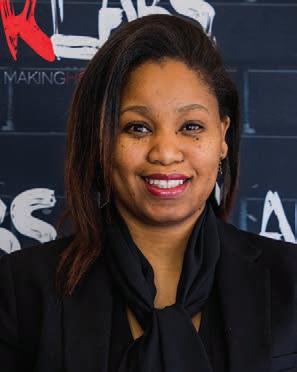
“Through the academy, we’ve trained, placed, mentored and graduated fty-three students with an eighty per cent average, engaging in impactful projects for Nedbank and achieving a nine out of ten NPS score.
“For Nedbank, this investment offers access to scarce data science talent, contributes to youth skills development, addresses unemployment and creates an opportunity for our data scientists to gain work experience.”
As a result of this training, the interns will get the chance to dive into real-world business environments, where they will not only gather invaluable experience, but also get the opportunity to revolutionise how the bank functions.
Nedbank’s 2023 Society Report highlighted the bank’s efforts to contribute signi cantly to South Africa’s educational landscape.
Working with nonpro t organisations (NPOs), such as TEACH South Africa (Teach SA), over the past 15 years, Nedbank has placed more than 760 ambassadors in over 416 schools across all South Africa’s provinces.
Meanwhile, Nedbank’s partnership with the Nedbank Eyethu Community Trust started in 2019. In 2023, 45 STEM (science, technology, engineering and mathematics) graduates were recruited as ambassadors and placed in the Department of Basic Education’s paid postings at 30 under-resourced schools in 15 districts across Gauteng.
In 2023, year 1 of their programme, they have reached 2 250 learners and will double this by the end of year 2.
All the ambassadors are university graduates, most with BSc degrees, while
11 have honours degrees. The gender demographics are 58 per cent female and 42 per cent male.
One NPO in the eld helping create environments and systems where people are impacted, empowered and transformed through hope, innovation, technology, training and economic opportunities is RLabs South Africa.
Established in 2009 in Bridgetown, Cape Town, RLabs has since expanded its model to 25 countries across 5 continents, impacting more than 20 million people through its work.
CEO Christine Taphel says: “Our success at RLabs stems from a deep connection with the communities we serve and our unwavering dedication to making hope contagious.”
She says RLabs emphasises creating environments where young people can excel by offering access to resources, mentorship, skills training and hands-on opportunities.
“Our approach is rooted in putting people rst, prioritising trust and relationships. Our ability to adapt and innovate ensures we stay responsive to evolving needs, allowing our solutions to remain relevant and impactful.”
Taphel says they link young people to employment opportunities through strategic partnerships with local businesses, corporate partnerships, government bodies and global networks.
RLab’s programmes are designed to equip youth with practical skills, entrepreneurial training and the con dence to pursue diverse career paths.
“Through job-readiness workshops, immersive training initiatives and practical work experience, we prepare them to meet workforce demands. We also collaborate closely with employers to create a talent pipeline, fostering mutually bene cial relationships between young job seekers and businesses.”
Taphel adds that corporate support has been instrumental to RLabs’ growth. It partners with companies that share its mission of youth empowerment and social innovation.
“By building meaningful partnerships, we create value for the young people we serve and the businesses committed to driving positive social change,” she concludes.
“RLABS EMPHASISES CREATING ENVIRONMENTS WHERE YOUNG PEOPLE CAN EXCEL BY OFFERING ACCESS TO RESOURCES, MENTORSHIP, SKILLS TRAINING AND HANDS-ON OPPORTUNITIES.” – CHRISTINE TAPHEL
For 26 years, STANDARD BANK and PAST have worked to establish African leadership in the science of our shared origins and help shape a brighter future
The fossil record of Africa documents an almost undisturbed history of life on earth. While discoveries in Eastern and South Africa have earned us the name “Cradle of Humankind”, the continent offers much, much more. From micro-organisms representing the earliest life on earth to mass extinction events documenting its almost complete devastation, these discoveries piece together a detailed picture of life’s history unlike anywhere else in the world. But these rocks offer more than just a glimpse into the past. Embedded in them are lessons that can help us shape a better, more sustainable future.
PAST (The Palaeontological Scienti c Trust) was founded in 1994 to preserve and promote Africa’s rich fossil heritage and to fund paleontological research and education across the continent. Standard Bank has been PAST’s principal African corporate sponsor since 1998.
Together, we have worked to establish African leadership in the science of our shared origins, to understand the evolution of life on the African continent over billions of years and to promote, through PAST’s All from One campaign, the unifying message that we are diverse but uni ed. The partnership has thrived because PAST’s support of research into Africa as the cradle of humankind and the wellspring of our common humanity aligns closely with the mission of a bank that “calls Africa home” and “drives Africa’s growth”.
This year marks the 26th year of our partnership and, in recognition of Heritage Month, we are proud to showcase some of the leading African work undertaken in the three decades of PAST’s existence.

• PAST was founded to support research at Sterkfontein Caves in 1994. PAST is one of the site’s major funders and supported the 20-plus year excavation of Little Foot, the world’s oldest and most complete skeleton of a human ancestor.
• PAST supports research spanning the full 3.8-billion-year history of life across all of Africa. It is the only independent African-based supporter of research by African scholars and postgraduate students into the continent’s rich fossil history.
• PAST funds research at the top fossil localities in Africa, from the Middle Awash in Ethiopia to Olduvai Gorge in Tanzania and the Cradle of Humankind sites in South Africa.
• PAST’s Walking Tall Educational Theatre Project has reached over 1.4 million learners and educators in Eastern and Southern Africa. The project has won major awards, including from Business-Arts South Africa, which recognised the role Standard Bank has played in sponsoring this innovative education programme.
• PAST and Standard Bank co-sponsored an Annual Lecture Series from 2003–2014 that featured some of the world’s top origin scientists such as Sir Richard Dawkins, Phillip Tobias, Richard Leakey and Don Johanson.
OF A BANK THAT “CALLS AFRICA HOME” AND “DRIVES AFRICA’S GROWTH”.
PAST’s All from One campaign was launched at Standard Bank by Sim Tshabalala in 2015. It is a programme that uses the shared origins of humankind to promote unity and social cohesion and the shared origins of life to promote nature conservation. A smaller version of the exhibition was a featured part of the South African Treasures exhibition at the United Nations in Geneva in 2016. To discover more about the impactful work PAST is doing and to support their initiatives, visit: https://past.org.za/










For more information: mediarelations@standardbank.co.za www.standardbank.co.za/southafrica/personal/ about-us/corporate-social-investment

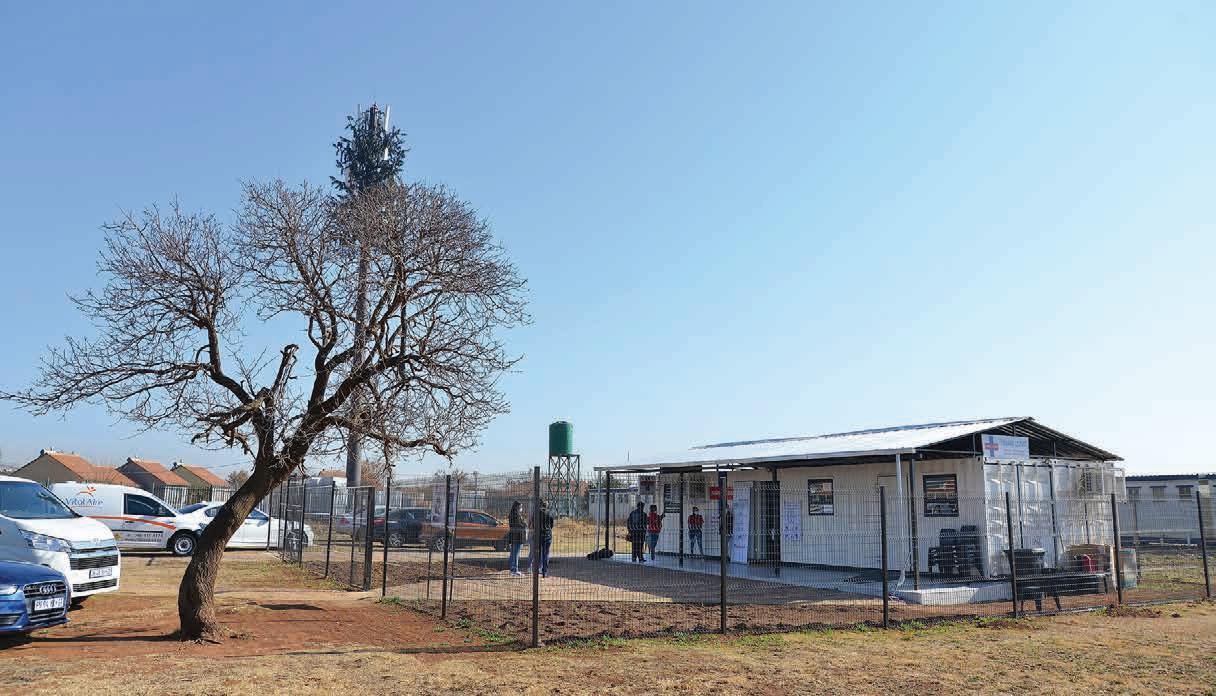
Despite the helping hands of a few, access to basic healthcare in rural areas remains a worrying challenge in South Africa. TREVOR CRIGHTON finds out what communities are doing to address these challenges
ccess to healthcare for the majority of people in underserved communities only lies with a local government clinic. Lynda Toussaint, CEO of Unjani Clinics NPC, says: “Often, rural patients have to travel very long distances in the early hours of the morning to join queues to access these services, but may be turned away due to capacity issues or queues being cut – this comes at signi cant cost to the patient in time, travel costs and the inability to receive treatment when required.
“With the signi cant strain placed on the government clinics, the time available to clinicians to share knowledge or educate patients is almost nil. And, the environment in which these clinicians are required to operate is not only stressful, but also impacts morale negatively.”

Unjai Clinics pioneered the rst nurse-led and -owned network 10 years ago. “The bene t of this is evident in the support of these clinics and their sustainability. Our model and its rural focus improve access to quality affordable healthcare in that people who could access healthcare ‘for free’, choose to pay an affordable rate for the convenient, empathetic and comprehensive care they receive from the Unjani Clinic in their community – at their point of need,” explains Toussaint.
Over 100 000 consultations are recorded through the Unjani Clinics network clinics each month – more than 1.2 million annually and more than 5.2 million since inception.
enrol for studies at academic institutions across South Africa. They do four weeks’ holiday work every year during their studies at their local hospital to learn how to integrate theory and practice and, on graduation, are employed by the Department of Health at their local hospital.
In 2023, 21 students graduated from the programme – 12 doctors, one pharmacist, two physiotherapists, two optometrists, one dietician, one dentist and two occupational therapists. Since its inception in 1999, UYDF has supported 593 graduates, with a 96 per cent progression rate. This year, UYDF is supporting 211 students studying a variety of health science courses at one of 14 academic institutions.
Unjani Clinics is a nurse-led network of primary healthcare clinics. Unjani Clinics NPC raises the funding, implements and manages the Unjani Clinic Network on social franchising principles, empowering mainly black women professional nurses to operate and ultimately own a private practice. “There are currently more than 220 care settings nationally in South Africa and more than 80 per cent of the Unjani Clinics in the network are in rural or outlying communities,” says Toussaint.
“That is 5.2 million consultations that did not have to occur in a government clinic, proving that the provision of choice to public patients will result in capacity-building and health systems strengthening,” says Toussaint.
“The effective sharing of the load helps strengthen our health system – but more importantly, we keep professional nurses in their profession and in our country, and they create much-needed permanent employment in the communities where they open clinics.”
The Umthombo Youth Development Foundation (UYDF), supported by the Discovery Fund, invests in rural youth who
“The reality in South Africa is that students in rural areas don’t have the same access to information as people in cities. UYDF is strengthening health systems in rural areas while also providing opportunities for local youth to get educated and give back to their communities,” says Andronica Mabuya, senior sustainability specialist at Discovery.
“The Discovery Fund is committed to making a lasting impact on public health in South Africa. By supporting initiatives, such as UYDF, we are not only investing in the future of our healthcare professionals, but also ensuring that quality healthcare reaches the most underserved regions of our country.”
“STUDENTS IN RURAL AREAS DON’T HAVE THE SAME ACCESS TO INFORMATION AS PEOPLE IN CITIES. UYDF IS STRENGTHENING HEALTH SYSTEMS IN RURAL AREAS WHILE ALSO PROVIDING OPPORTUNITIES FOR LOCAL YOUTH TO GET EDUCATED AND GIVE BACK TO THEIR COMMUNITIES.” – ANDRONICA MABUYA
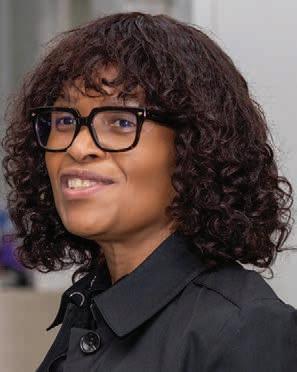
To create resilient communities, businesses are focusing on the wellbeing and growth of the individual, recognising their importance in the larger picture, writes BUSANI MOYO
Even though environmental, social and governance (ESG) principles can potentially improve the lives of communities by making them more resilient, initiatives driven by two companies in South Africa, Growthpoint Properties and Liberty Two Degrees (L2D), show the importance of focusing on the wellbeing and growth of each individual as a means to uplift entire communities. This view is based on realising that prosperous individuals are the bedrock of resilient and thriving communities.
Shawn Theunissen is the head of corporate social responsibility at Growthpoint Properties, South Africa’s largest primary JSE-listed real estate investment trust. Asked how his company’s ESG investments are helping communities become more resilient, he says: “Our unique approach focuses on empowering communities through skills and education with a strong emphasis on creating sustainable change and reducing dependence through strategic partnerships and targeted programmes.”
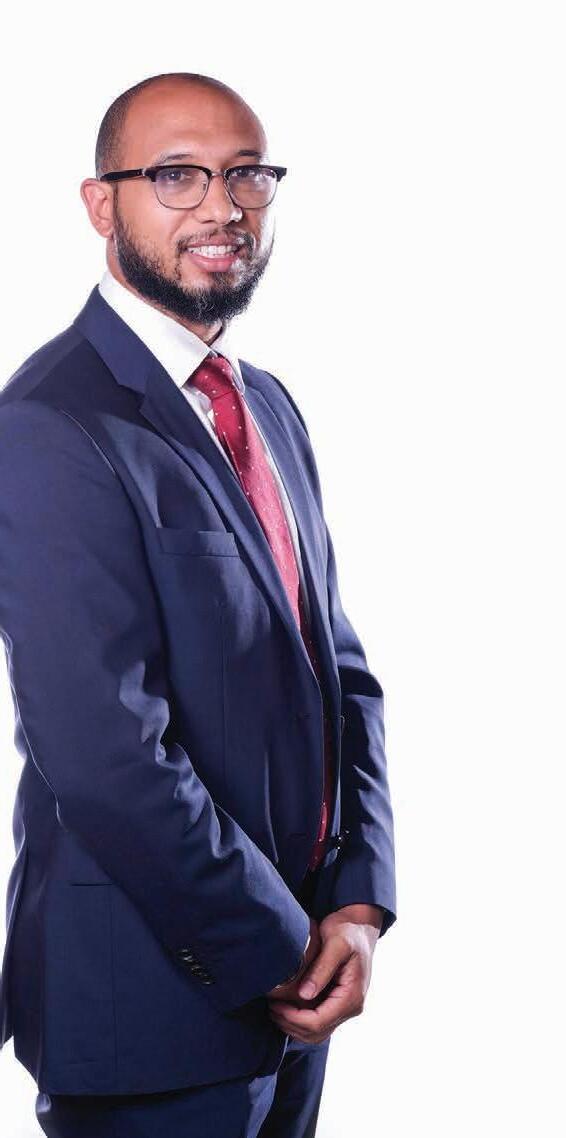
Theunissen identi es several initiatives his company uses to enhance social outcomes, address inequality and promote social cohesion. These include partnerships with nonpro t organisations that signi cantly impact childcare quality in remote and rural areas, an internal educational programme aimed at supporting the children of lower-income staff members, allocating each staff member eight
hours per year for volunteer work, and using enterprise and supplier development to unlock real supply chain opportunities and promote job creation.
Yongie Ntene is the people and culture lead at L2D, a precinct- and predominantly retail-focused South African portfolio. Speaking about how her company is helping communities to be more resilient, she says: “L2D is committed to supporting sustainable and inclusive growth in the property sector and positively impacting the communities where we operate. One of the ways we achieve this is by addressing the critical challenge of exempted micro enterprises and qualifying small enterprises that struggle to take their businesses from survivalist or micro level to a level of sustainability and pro tability.”
space was an opportunity for me to grow and meet with different people from different professions.”
Akandi Of ce Furniture is a 100 per cent black-female-youth-owned of ce solutions company. It was contracted to furnish L2D’s new headquarters in 2020 and became a supplier in 2021. Moabi says L2D assisted her company in establishing a showroom for its furniture, making it possible for the company to grow faster and employ more people. She says the one thing she appreciates about L2D is that “they pay in advance for their orders, and we do not have to wait 30 days to be paid.”

It’s easy for companies to have lofty slogans about how their ESG programmes impact communities. However, the reality of the impact is in the voices of the people the programmes bene t. For L2D, examples of such people are Reabetswe Moabi, the director and founder of Akandi Of ce Furniture, and Talent Ncube, a pencil sketch artist based at Nelson Mandela Square in Sandton, Johannesburg.
Ncube is a bene ciary of L2D’s Enterprise Development youth-focused initiatives. Ntene says: “Talent’s exceptional skills in painting and sketching lacked a platform until Liberty Two Degrees provided him the opportunity to showcase his work at Nelson Mandela Square.”
Asked how L2D’s assistance bene tted him, Ncube says: “Liberty has created a space of diversity and culture, and affording me that
One of the programmes at Growthpoint that directly impacts communities is Growsmart. According to Theunissen, this Growthpoint-funded educational programme “is designed to boost literacy and numeracy in South Africa”. He adds: “In 2024, this project reached 285 schools across two provinces. Learners were supported with 776 story-writing stationery packs and 89 300 Growing Smarter books were given out as classroom aids and take-home resources. Indirect bene ciaries include over 102 000 Grade 4–6 learners across the Western Cape and Eastern Cape.”
Talent Ncube shares his story of change.






It’s easy for companies to have lofty slogans about how their ESG programmes impact communities. However, the reality of the impactis in the voices of the people the programmes benefit.

























Publication date: MARCH 2025

Small, Medium, and Micro Enterprises (SMMEs) play a pivotal role in driving innovation, creating jobs, and fostering economic growth.
ADVERTISING CONTACT
Tarin-lee Watts | Project Manager
Tel: +27(0) 87 379 7119
Cell: +27(0) 79 504 7729
Email: wattst@arena.africa
PICASSO HEADLINE, a proud division of ARENA HOLDINGS (Pty) Ltd Hill on Empire 16 Empire Road (cnr Hillside Road), Parktown, Johannesburg






Youth unemployment in South Africa has reached crisis levels, rising from 36.1 to 46.6 per cent among the 15–34 age group over the past decade, according to Stats SA’s Quarterly Labour Force Survey Q2: 2024. This group faces the highest unemployment rate, presenting a signi cant challenge for the nation’s future.
Launched in 2007, the JumpStart skills development programme equips youth with in-demand skills for the retail and manufacturing value chain. Post-training, candidates enter the industry talent pipeline with opportunities for placement across employer partners or entrepreneurial support to start small businesses.
Key learnings from the JumpStart programme include:
• Demand-driven approach: partnerships with the private sector are crucial to align skills development programmes with industry needs and facilitate job placement opportunities. JumpStart’s exible and agile programmes continuously evolve to equip candidates with skills relevant to the rapidly changing work environment.
• Data-driven decision-making: deep data insights and monitoring capabilities ensure real-time response to job opportunities, leading to higher employment absorption and sustained conversion rates. In the 2024 nancial year, JumpStart achieved a 90 per cent employment rate, with 7 252 youth developed and 6 571 employed.
• Focus on conversion rate: the true measure of success is the conversion from short-term to long-term employment. It’s not about presenting as many quali ed candidates as possible, but building
pro ciencies and upskilling people according to market demand.
• Ready for Day 1: equipping candidates with life skills and real-life work experience ensures they are prepared for immediate employment. This approach bene ts both candidates and employers, deepening understanding of the working environment and allowing for better assessment of potential hires.
• Embedding entrepreneurship education: recognising the emerging entrepreneurial intent among youth, JumpStart incorporates entrepreneurial training to harness technical skills and provide viable alternatives during market downturns.
To maximise impact, social investors should focus on the multiplier effect of purpose-led partnerships. Collaboration among social investors, philanthropists, government and corporate foundations is crucial to catalyse collective potential and create youth employment opportunities. The JumpStart programme offers retail and manufacturing value chain skills development initiatives, carefully crafted in partnership with industry and tailored for youth ranging from matriculants to tertiary graduates. These programmes last between two weeks and eight months, applying design-thinking principles to ensure talent development aligns with industry needs.
To unlock employment opportunities and create hope for the youth, key role players must align investment strategies and integrate programme executions. Social investors should embrace a noncompetitive spirit, sharing leading practices with the common goal of creating youth employment opportunities.
OCTAVIUS PHUKUBYE , director of Mr Price Foundation, shares insights from the Foundation’s JumpStart programme, highlighting how social investment initiatives can contribute to the economic empowerment, education and social development of the youth LEAR N MORE
The impact of social investment is ultimately judged by outcomes in society – the resilience of economic opportunities enabled, sustainable jobs created and improved livelihoods that address poverty, unemployment and income inequality challenges.
The youth unemployment crisis in South Africa requires immediate and concerted action. By focusing on demand-driven, data-informed approaches and fostering collaboration across sectors, we can create meaningful change. The JumpStart programme’s success demonstrates the potential for well-designed initiatives to make a signi cant impact.

As we move forward, it’s crucial to remember that our youth are our future. By investing in their skills, providing real-world experience and fostering entrepreneurship, we’re not just addressing unemployment; we’re building a stronger, more resilient South Africa.
The path to hope for our youth starts with us all. Through collective effort, innovative approaches and unwavering commitment, we can create a brighter future for the next generation and for our nation.
On a mission to drive social change and unlock potential: Mr Price Foundation

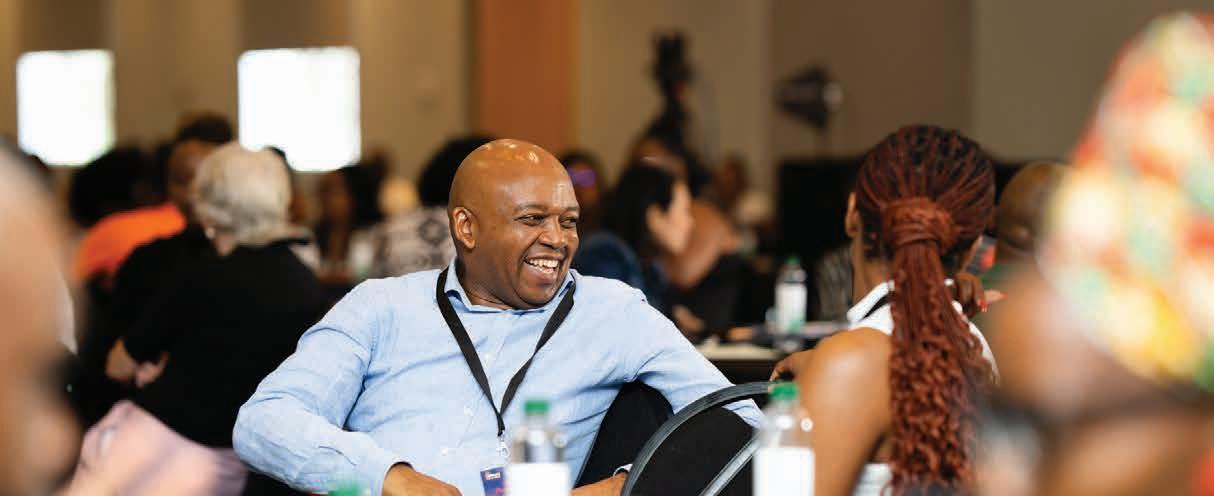
The intersection of education and unemployment has long been a critical area of focus in South Africa. With a persistently high youth unemployment rate and educational outcomes lagging global standards, innovative solutions are necessary to tackle these challenges, writes THE LEARNING TRUST
The Learning Trust (TLT) is an intermediary grant-maker providing funding and capacity support to emerging After School Programmes (ASPs) in South Africa, focusing on improving educational outcomes in underserved communities. Through the Social Employment Fund (SEF), TLT is demonstrating how strategic interventions can deliver multifaceted bene ts for learners, youth and society at large.
The SEF is an initiative under the Presidential Employment Stimulus, designed to create meaningful work opportunities while addressing societal challenges.
The SEF has proven to be a much-needed tool for combatting youth unemployment.

Managed by the Industrial Development Corporation, the SEF operates on a model that creates work for the common good, enabling organisations to scale their impact while providing participants with income, skills and experience.
The emphasis on ‘work for the common good’ means that these opportunities do not just serve as temporary relief from unemployment, but also contribute to long-term societal bene ts.
One of the standout features of our SEF project is the collaboration with ASPs. These programmes, which provide additional support beyond the classroom, play a crucial role in improving educational outcomes.
Through the SEF, TLT has expanded the reach and impact of ASPs. The results have been remarkable: over 100 000 learners reached, 50 community-based organisations convened through the Catch-up Coalition and more than 10 000 paid work opportunities created.
Research commissioned by TLT highlighted that ASPs participating in the SEF have improved learning outcomes, expanded access to quality education and developed more resilient organisations.
The SEF has proven to be a much-needed tool for combatting youth unemployment. Young people participating in the SEF have gained valuable work experience, developed new skills and increased their con dence and employability. This, in turn, has had a ripple effect, as participants have
been able to contribute nancially to their households, further their education or explore entrepreneurship opportunities.
The work experience provided by ASPs is particularly valuable because it is grounded in real, community-focused initiatives. Participants are contributing to efforts that have a tangible impact on their communities.
The collaboration between SEF and ASPs has also had a deep impact on community-based organisations. Many of these organisations have seen their capacity strengthened, their networks expanded and their visibility and reputation enhanced. This has enabled them to attract additional funding, scale their programmes and deliver even greater impact.
South Africa cannot afford to continue with high dropout rates, low literacy levels, and widespread unemployment. After School Programmes offer a powerful solution, addressing educational challenges while creating employment opportunities.
By integrating ASPs into the education ecosystem, South Africa can turn the tide on inequality and social exclusion and build a brighter future for children and young people in underserved communities. Now is the time to invest in after-school programmes, leverage the talents and energy of our young people, and ensure that every child has the opportunity to succeed.

Scan to go directly to The Learning Trust website

For more information: info@thelearningtrust.org www.thelearningtrust.org
Without access to quality ECD over 50 per cent of children are not developmentally ready when they get to Grade R.


A focus on educational programmes and initiatives aimed at closing the gap in access to quality education in underserved communities.
By VUKANI MAGUBANE
Underserved communities suffer from an education gap that hinders academic achievement and limits future opportunities. Lack of access to quality early childhood education triggers a ripple effect, impacting every stage of a learner’s academic experience, setting them up for lifelong challenges and the underachievement of their potential.
Despite the enormous challenges, some organisations are championing innovative educational programmes and initiatives that provide support beyond the classroom at the community level.
“The after-school sector plays a signi cant role in bridging learning gaps. It’s an extension of the classroom,” says Charlene Petersen-Voss, executive director of the Learning Trust (LT), a nonpro t organisation that provides funding, capacity-building and advocacy for after-school programmes.
After-school progammes (ASPs) have become a critical partner in the educational ecosystem. The pandemic signi cantly impacted learning, particularly in underserved communities where lack of resources made learning nonexistent, causing students to fall behind, further exacerbating poor learning outcomes.
Peterson-Voss says access to after-school support has traditionally been available for the privileged few who can afford to pay for extramural programmes, sports and educational support.
She strongly believes that supporting emerging organisations and start-ups providing ASPs in underserved communities will help build quality programmes that provide a safety net for young people struggling in overcrowded classrooms with little or no support.
“The after-school sector creates a supportive, nurturing environment to learn, grow and develop. Classroom learning is often pitched above their heads. There is pressure in the classroom –teaching is at levels way ahead of the kids,” says Peterson-Voss.
“Education recovery is not only happening in the classroom. We want to do more to bring awareness and advocacy and lobby government for the sector to be recognised formally.”
The Learning Trust was founded nearly 15 years ago and has reached over 100 000 learners countrywide. “We still have work to do in rural communities. We have a long way to go as we are not reaching enough learners,” she adds.
The LT focuses on two pillars. The rst pillar is identifying and providing grants to emerging and start-up organisations and helping them with fundraising, governance and building the capacity to deliver quality programmes. The second pillar targets core programmes delivered through the Catch-Up Coalition of 50 to 60 organisations across the country that conduct various projects to recover post-COVID-19 education losses in areas, such as literacy and numeracy, to shift the dial on these outcomes, Peterson-Voss says.

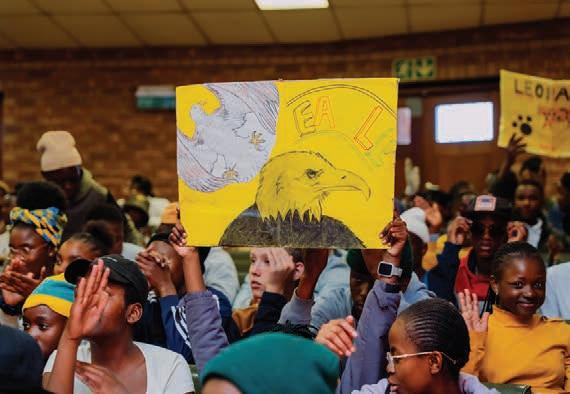
The Early Learning Resources Unit (ELRU) was founded in the early 1970s to address gaps in Early Childhood Development (ECD) and has played a signi cant role in shaping preschool education in the country. It has impacted over six million practitioners since the 1970s.
“Without access to quality ECD over 50 per cent of children are not developmentally ready when they get to Grade R,” says ERLU CEO Tracy Fortune.
“Quality ECD programmes result in improved child outcomes and children who are developmentally ready for school. Without access to quality ECD, they lag by two years when they reach Grade R.”
ELRU’s work centres on access and quality education in the ECD stages. It provides accredited training for ECD practitioners in the communities where they live. It also provides support for ECD centres to ensure they deliver quality programmes during this critical stage of development to improve education outcomes.
“Our next focus is on home-based ECD – to support pregnant moms at home through our family and community motivator programme, which is aligned with international standards,” says Fortune. “We work in the most impoverished communities. We teach them how to use things in the home to try and level the playing eld.”
Members of the Izinini Community Trust from Bizana in the Eastern Cape are thriving as Khulisa timber suppliers.
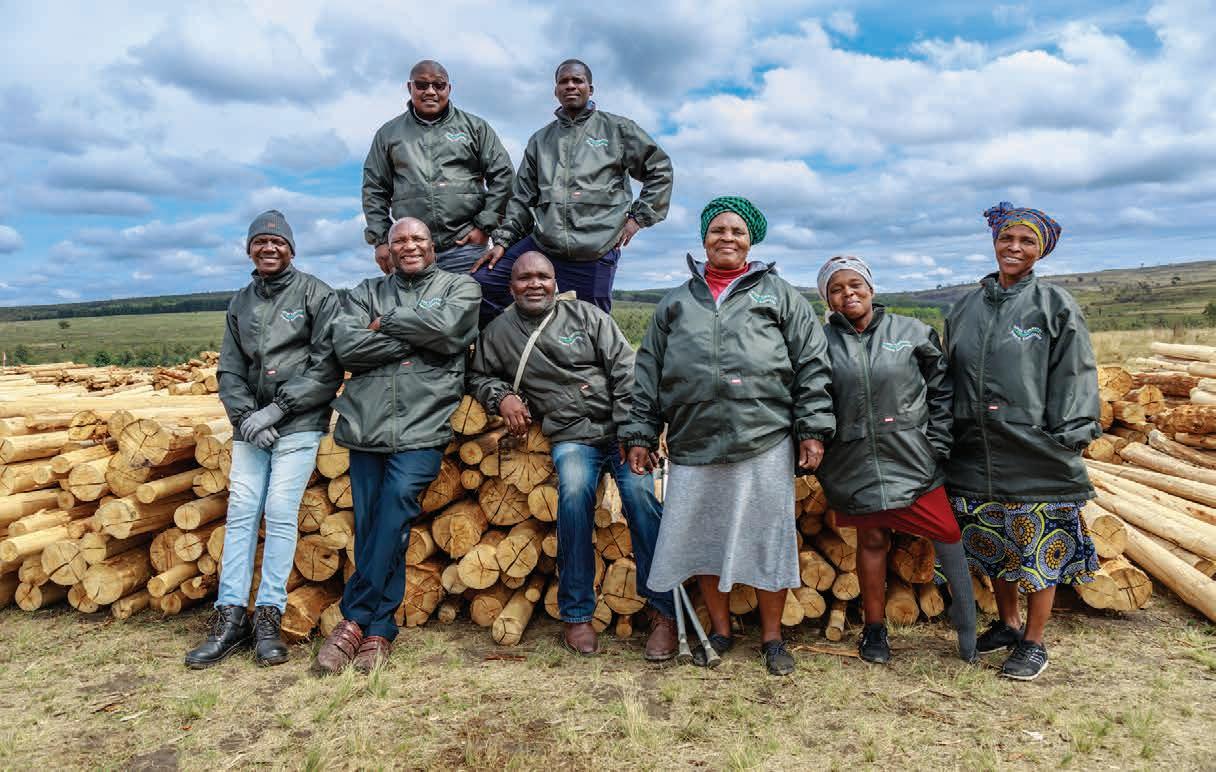
Sustainable forestry is at the heart of Sappi’s values as is the role it plays in uplifting rural communities and providing education and support to small growers, writes SANDILE NKOSI, general manager of the Sappi Khulisa Enterprise Supplier Development programme
With nearly 400 000 hectares of land dedicated to timber cultivation, Sappi Forests is a cornerstone in South Africa’s forestry landscape. Leveraging decades of industry experience, Sappi not only excels in sustainable forestry, but also plays a pivotal role in uplifting rural communities.
As a large corporate operating in deeply rural areas, Sappi’s extensive footprint provides access to thousands of other landowners, enabling their entry into the forestry value chain, empowering them to bene t from the company’s expertise and providing access to the pulp and paper manufacturing market.
Entering the heavily regulated forestry industry in South Africa can be challenging for small rural growers and obtaining water use licences can be time-consuming and costly. They may also struggle to access affordable nancing options, limiting their ability to scale operations. Rural areas often lack the infrastructure, such as
THE KHULISA ROADMAP
roads for transporting timber and access to processing facilities, making it dif cult for small growers to manage and transport their products.
Around 2017, Sappi rebranded its small grower programme as Sappi Khulisa and changed the focus to become an enterprise supplier development programme, aimed at removing some of the barriers.
The Khulisa roadmap educates small growers on best practices to boost timber productivity and pro tability. Through training, eld days and regular visits, growers gain essential skills and knowledge. They also learn about agroforestry opportunities for additional income while waiting for timber crops to mature. Financially, Sappi provides free seedlings, technical advice and silviculture assistance. The company also offers crucial support for crop and community protection, including rebreaks and wild re response strategies.
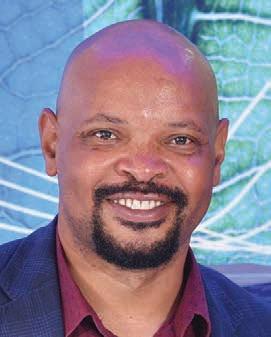
The seedlings it provides are from the same planting stock Sappi uses for its plantations. Growers bene t from Sappi’s state-of-the-art R&D teams Sandile Nkosi

that work tirelessly to produce genetically superior seedlings resistant to known pests and diseases and bred for climate change conditions.
The company also helps new participants to bene t from the forestry value chain by assisting with water licence applications.
Sappi also provides a guaranteed market for timber at equitable rates. The impact of the Khulisa programme on rural development is illustrated by the R3.334-billion Sappi has paid to its timber suppliers since 1995. A team of 42 Sappi Khulisa foresters work with just over 4 000 small growers, helping to manage their 37 269 hectares of land.
Sappi’s efforts have spurred development in previously underdeveloped areas, such as Manguzi and parts of the Eastern Cape, through timber harvesting. Besides supporting timber growers, Sappi has identi ed at least 942 entrepreneurs who have gained access to the forestry value chain by offering associated services such as silviculture, harvesting, loading, and transportation activities. This growth also boosts other local businesses, for example, vehicle maintenance, hospitality, protective clothing and fuel stations.
The bene ts to the participants are evident, as people residing in remote rural areas can use their access to land to earn a digni ed and viable livelihood for themselves and their families.
To meet the rising demand for timber, Sappi ensures responsible sourcing by maintaining dual FSC and PEFC certi cations and helping external suppliers achieve international certi cation. The recent certi cation of ve founding members of Sappi’s rst PEFC Group Scheme was a key step in promoting responsible forestry and socioeconomic transformation in rural areas.
What started 40 years ago as a small corporate social investment project with only three farmers has blossomed over the years, developing a larger pool of partner timber growers through the Khulisa programme. Sappi is committed to seeking more opportunities to expand this access to even more participants.
In response to an increasingly high youth unemployment rate, Sappi is providing technical skills education through its Skills Centres
Amid the rising youth unemployment rate, which stands at an alarming 46.6 per cent, according to Stats SA’s Quarterly Labour Force Survey Q4:2023, Sappi has directed its social impact efforts toward initiatives that empower young people to access economic opportunities.
South Africa faces a critical shortage of technical and artisan skills, a gap that poses signi cant challenges to economic growth and social development. Recognising this pressing need, Sappi has taken proactive steps to address the skills de cit through innovative training programmes. These initiatives aim to meet the company’s operational needs and strive to create a positive social impact by uplifting local communities.
The overarching goal of the Sappi Skills Centres located in KwaZulu-Natal and Mpumalanga is to create a learning environment that enriches the lives of both Sappi employees and the local community. By providing and enhancing technical vocational skills, these centres empower employees to improve their job performance and enable community trainees to establish sustainable service businesses or secure meaningful employment.
The COVID-19 pandemic, despite its many challenges, also brought unexpected opportunities. For apprentices at the skills centres, the pandemic inspired the creation of a new business to supply reusable cloth masks and other personal protective equipment (PPE) in South Africa. These apprentices demonstrated
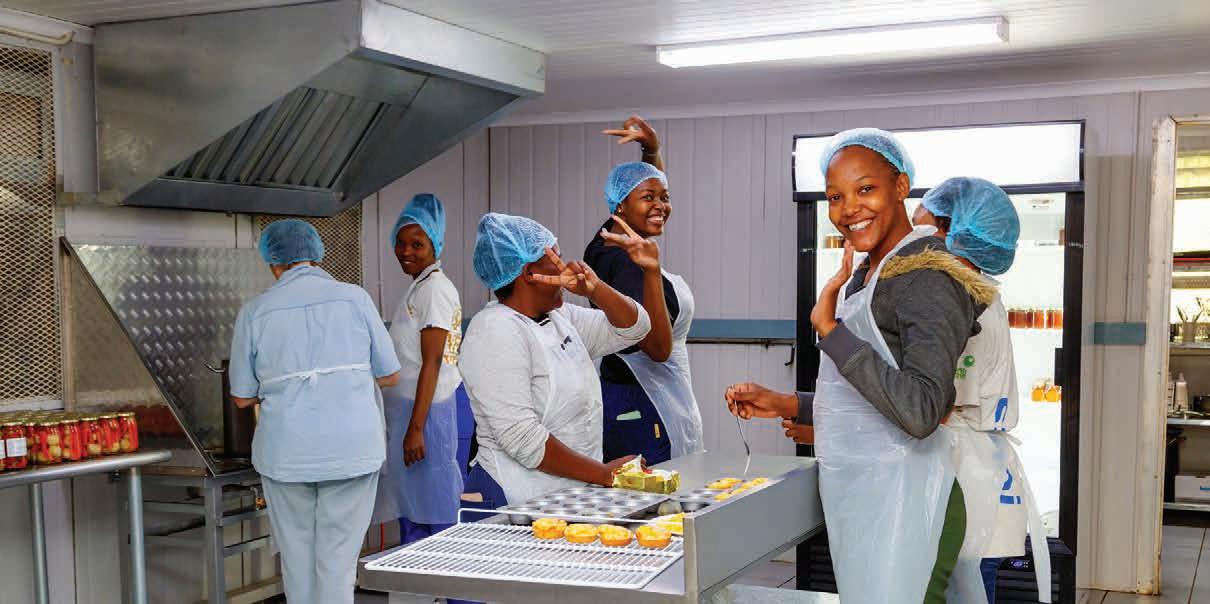
a remarkable aptitude for sewing and the business acumen to become reliable suppliers.
Recognising the growth potential, Sappi supported the establishment of Amadansana (isiZulu slang for overalls), a company that now supplies PPE speci cally designed for Sappi workers. The products not only meet, but also often exceed health and safety requirements.
Another innovative intervention addressing youth unemployment is the Ngodwana Aquaponics project – a community-operated aquaponics farm in the Eland’s Valley which not only provides employment opportunities, but also aims to enhance local food security by providing affordable, high-quality protein through locally farmed redbreast tilapia sh.
In its initial phase, the project onboarded 30 local youths, upskilling them in aquaculture and providing training in vegetable and herb production. The project diversi ed its offerings by including a range of high-end products for sale at a farm stall established for this purpose. These sought-after artisanal products, such as macadamia pesto, grapefruit marmalade, piquant capsicum peppers, tomato jam and hot chilli sauce, supplement the income from sh production, allowing the venture to maintain an affordable price point.
“Initiatives such as this create economic opportunities, foster community growth and contribute to a stable, healthy ecosystem for our business,” says Melanie Jacobs, Sappi Limited’s global process owner for talent, performance and learning. “These initiatives allow youths to channel their talents into productive and digni ed economic activities, ultimately opening new doors for their future,” she explains.
By investing in the potential of young people,
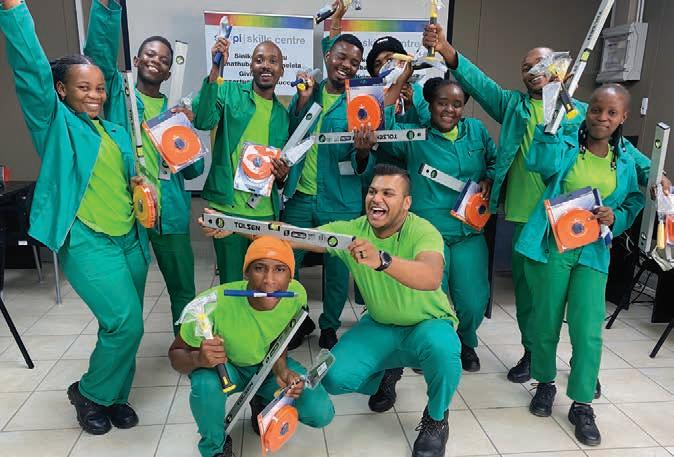
Sappi is helping to build a more skilled, resilient and prosperous future for South Africa. The success stories emerging from the Skills Centres and the Ngodwana Aquaponics project are a testament to the transformative power of education and the enduring impact of community-focused initiatives.





